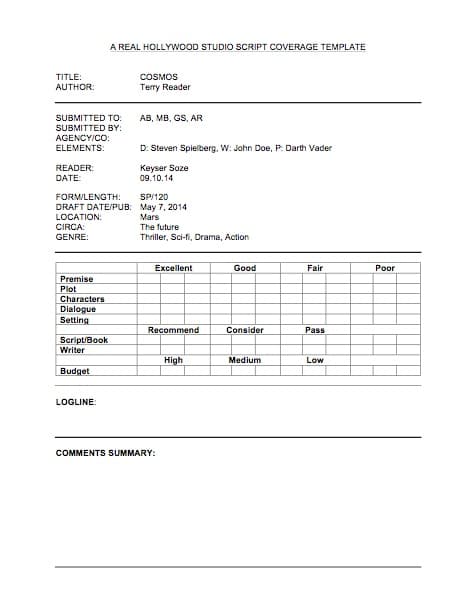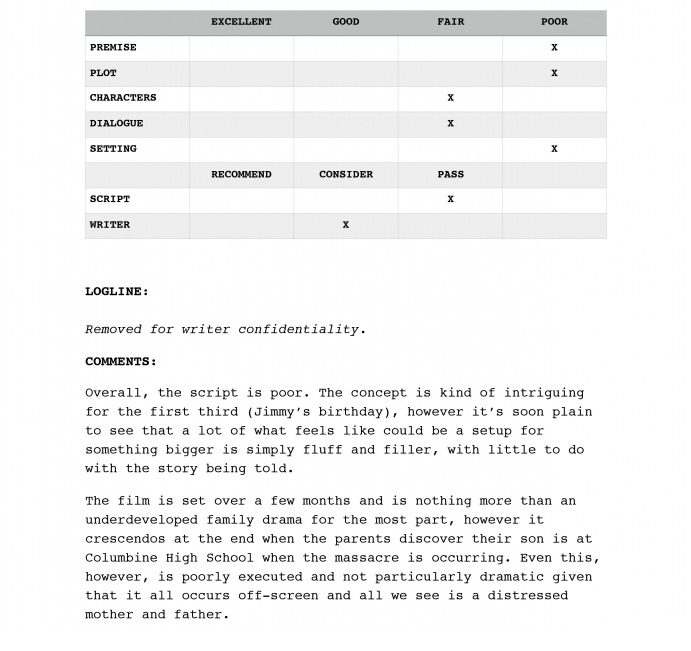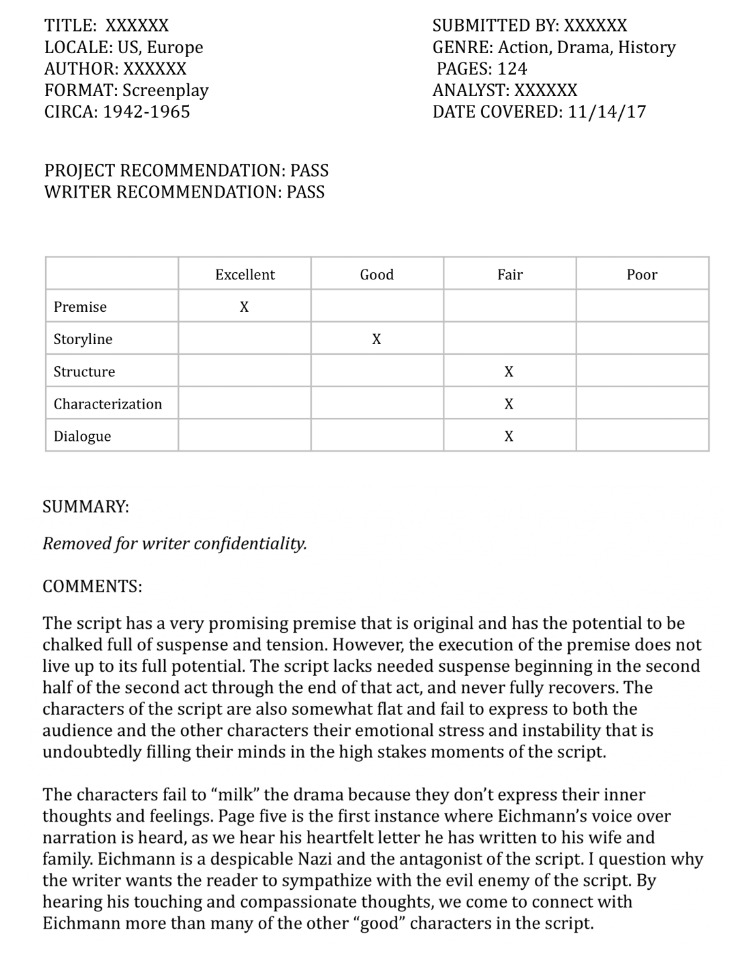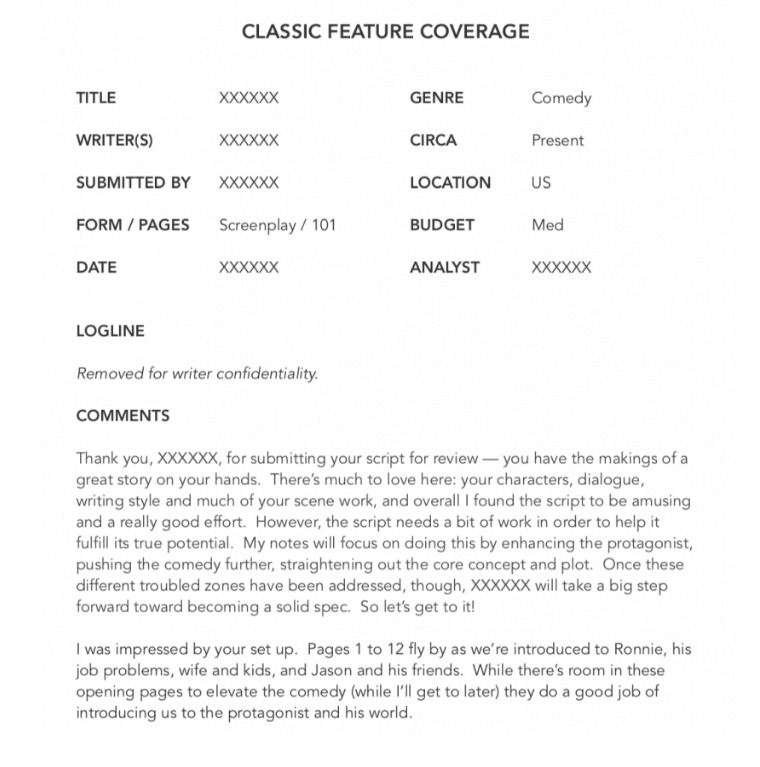
What Does Good Script Coverage Look Like?
Considering that most script readers don’t even get the luxury of seeing a movie star or hearing stunningly orchestrated music when reading your screenplay, you might think that receiving good script coverage would be simple.
I mean just supply them with a few popcorn snacks and they’d be content, right? Wrong! While providing an array of delicious treats certainly won’t hurt, there’s much more to getting quality script coverage than feeding someone snacks. Although, it is an essential part.
After reading hundreds upon hundreds of scripts as both a writer and reader myself, I’ve come to learn what constitutes good, no, great coverage and how you can ensure yours stands out from the pack. So, grab your notebooks if only for all those tasty takeaways because we’re about to dive into all things related to excellent script coverage!
What Is Script Coverage?
Have you ever analyzed a film or television show so much that you feel like a screenwriter yourself? Well, if you’ve ever wanted to look at the business side of storytelling, script coverage might be the job for you.
Script coverage is basically when an industry professional looks through a storyline and provides illuminating insight about how it could work better. They can even provide valuable advice about a script’s commercial viability.
The person reading the draft is essentially playing literary detective as they uncover every single detail in order to present a report back to the people involved with the project.
How Long Should Script Coverage Take?
Script coverage is often viewed as the Fyre Festival of freelance jobs. You think it’s gonna be a good time, but in reality, it can take longer than any sane person would want.
Script coverage is no easy task. It requires an excruciatingly detailed read of the script, summation of its contents into an understandable report, and then often a summary of thoughts and opinions.
And sure, sometimes all this can be accomplished over a few binge-writing hours. But often these reports need to be full, meaningful commentaries that require perspective, analysis, critique and more than a little bit of careful consideration.
So next time you request feedback quicker than blackjack being dealt out at a Vegas casino, just remember that quality takes time.
How Much Is Script Coverage?
Script coverage can be expensive to get, but then again so is life. Without proper script coverage, you may completely miss out on a great opportunity. If a story is worth telling, it will be worth investing in, just like anything else.
So, if your screenplay needs an honest assessment from an unbiased expert, don’t forget that getting good script coverage could potentially cost you as much or more than your morning latte with avocado toast. Just think of it as the price of admission for aspiring filmmakers.
Where Can I Get Script Coverage?
It’s a common question among aspiring screenwriters: where can I get script coverage? If you don’t have your own personal eyes scanning every word of your script, you need to go out and find some.
Thankfully, there’s no shortage of sites that provide script coverage services. You can even pick up “standardized” reviews from sites like Script Reader Pro or Screenplay Readers. But be warned!
Some of these so-called experts might shower your masterpiece with praise, whether it deserves it or not! So do your research, shop around for the best price, and make sure the reviewer has connected to the material before committing to their services.
Looking for reliable and comprehensive script coverage services? Look no further than the Big Five:
- Script Savvy
- Creative Screenwriting’s Tracking Board
- Go into the Story
- Raindance
- Virtual Pitch Fest
All of these services offer trustworthy critiques and review to provide you with invaluable insight into your screenplay. From detailed reports that break down plot points and provide a thorough analysis of character arcs to industry notes that give you an inside look at how producers might receive your story.
These five services got you covered. Do yourself a favor and leave your script in one of their capable hands.
Script Coverage Template
Script coverage is an integral part of the movie-making process. It provides readers with a comprehensive evaluation of a screenplay that can help producers, development executives, and other stakeholders make informed decisions.
A great script coverage template ensures that those responsible for evaluating scripts have the necessary tools to accurately assess scripts. Not only does it promote efficiency, allowing readers to quickly evaluate material, but it also provides an objective basis for comparison.
Script coverage templates should include scene-by-scene breakdowns along with personal impressions as well as re-writes or story development recommendations.
Utilizing a robust and well-formulated script coverage template helps create a consistency between script evaluations which is essential for successful filmmaking in today’s competitive market.
Examples Of Script Coverage
A standard method for grading scripts is through a “traffic light” system; each element within the script is marked either green (positive) or red (negative).
Summaries are intended to be comprehensive yet brief, so that industry workers can quickly get a sense of the material’s potential quality and make informed decisions about whether or not to move forward on a project.
By using script coverage processes to evaluate works-in-progress, filmmakers are well-armed when assessing their next project.
Recommend, Consider, and Pass Coverage

When evaluating scripts for production, script coverage using recommend, consider, and pass methods is one of the most frequent processes.
This type of coverage involves a thorough read-through of the entire script to evaluate story elements such as concept, characterization, dialogue, plot structure, setting and visuals.
After the assessment is complete a professional recommendation is made with one of the three ratings: recommend, consider or pass. The recommend rating implies that the script is well-crafted and ready for production and therefore producers should take interest in it.
Consider represents scripts that have some potential but require improvement before they are ready for production.
Pass implies that the script should not be considered further due to weaknesses in any areas particularly story or concept. The recommend/consider/pass method offers an effective way to identify quality scripts quickly.
Script Recommendation and Writer Recommendation Coverage

One example of coverage that can be effectively used is the project recommendation and writer recommendation method.
This two-fold approach starts by evaluating the project itself, including overall originality and genre potential, while also providing specific notes on elements such as tone, plot, pacing, and structure.
Once these project recommendations are made, which may include color comments regarding story execution, a thorough review of the writer’s individual capabilities follows.
Writer recommendations examine their skill level and technique with dialogue, character development, composition, depth of thought and other narrative qualities.
By employing this project recommendation and writer recommendation process for coverage, a clearer understanding of the project at hand can be gained as well as an insight into any possible improvements or further revision needed from both project or writer perspectives.
Classic Coverage

One of the classic tools for assessing the quality of a script is classic script coverage. This form of analysis assesses how well the story has been crafted, what could be done to improve it, and whether or not it’s good enough to make it in the industry.
It provides detailed observations and comments regarding story elements, characters, plot points and other related components. Although classic coverage can be beneficial for writers, it is always important for them to understand that these reviews represent only one person’s opinion.
Final decisions must come from the writer themselves as they are acutely aware of their own intentions with their scripts.
Overall, classic script coverage can provide valuable insight into how others view a writer’s work and give them the information they need to make informed decisions about their screenplay.
Conclusion
So those are the basics of script coverage. It’s a fairly simple process, but one that is vitally important to the development of a project. By taking the time to get good, honest feedback on a screenplay, you can save yourself and everyone else a lot of time and energy down the road.
Related: